I participated in a public debate on Sunday. The July 10 debate was part of Artillery Magazine's ongoing series "Artillery Sets the Standard," and was held at the Standard Hotel in downtown Los Angeles. Many thanks to publisher Paige Wery and editor Tulsa Kinney for inviting me to participate. There were four debates and it made for a lively and informative afternoon (the free vodka didn't hurt).
The debate was: "MFA: Is it Necessary?" I was debating the "con" side of the question. The format was a four-minute presentation, followed by a two-minute rebuttal, a one-minute rebuttal and a 30-second conclusion. When Artillery posts the full video of the debate, I will post it on my blog. Meanwhile, here is the text of my presentation and conclusion along with my Power Point slides:
Hello. My opponent has made some interesting points, some of which I'll address in my presentation, others will have to wait for the rebuttal.
I don't have a degree in anything -- I dropped out of college in my junior year. I felt I was wasting my parents' money, majoring in marijuana and guitar.
A degree is not something I look for when selecting artists for Offramp Gallery. The bottom line is always the work. I look for work that's honest, creative, original, skillfully executed and intensely visual. It's supposed to be VISUAL art after all.
Everyone has an opinion on this subject. But I wanted data, facts to back up my point of view.*
First of all -- the only situation for which you are required to have an MFA is if you want to teach studio art at the university level. There are precious few tenured teaching positions available and competition for them is fierce. Most artists I know end up chasing adjunct jobs across several counties and/or have an unrelated day job.
Then I looked at the artists I've shown at Offramp. 48% have MFAs. So, there is no advantage, no disadvantage.
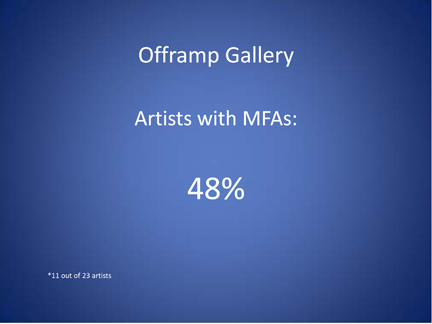
But what about other commercial galleries? I spent an insane amount of time researching artists from several successful commercial galleries. You may be surprised at what I found.
LA Louver: 56% have MFAs
Blum & Poe: 55%
Ace: 41%
Gagosian 34%
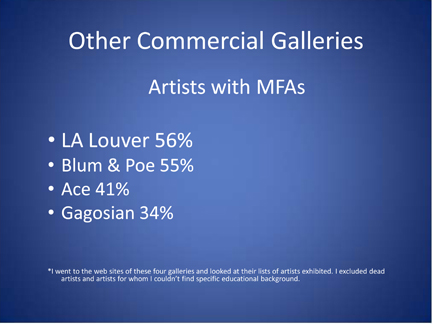
If you put those numbers all together (including Offramp), only 40% of the artists have MFAs.
Next I looked at ArtFacts.net which ranks over 200,000 artists using a special algorithm based on which galleries and museums artists have shown at, with whom, etc. I looked at their top 50 living artists -- and of those 50 top living artists only 11 out of 50, or 22%, have MFAs.
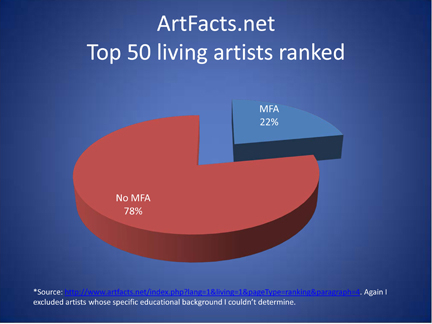
Typical costs for a two-year MFA in studio art are $28,000 - $73,000, and a three-year program would be $41,000 - $109,000. That's a lot of student debt to carry after graduation.
I also put together a little survey and sent it to my email list. I asked the respondents who were artists to what degree they were able to make a living as an artist. As you can see there wasn't that much difference between artists with or without an MFA.
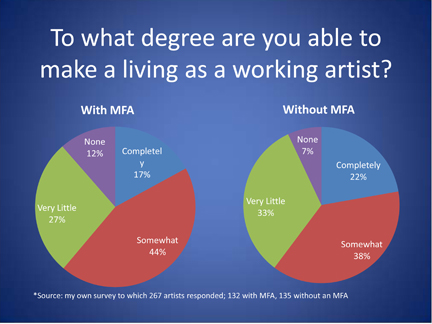
I looked at the Pollock-Krasner Grant recipients for 2009-10. Out of 75, 40 have MFAs, or 53%. Again, no clear cut advantage.
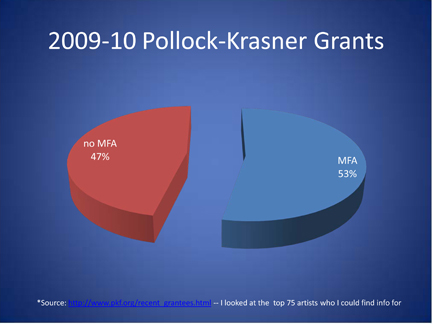
So, from all the statistics I was able to put together there seems to be no distinct advantage to having an MFA -- for getting a gallery, showing in museums, for making a living as an artist and for getting grants.
And what are these schools teaching? I personally think there is an over-emphasis on dialog and an under-emphasis on content. We're teaching artists to TALK about art. Anything is art as long as you can justify it using the codified language of academia. As my friend Ted says, there's no good art, no bad art, just an endless dialog about art.
Finally I want to quote New York Magazine art critic Jerry Saltz in a recent article about the Venice Biennale and what he calls "Generation Blank":
"It's work stuck in a cul-de-sac of aesthetic regress, where everyone is deconstructing the same elements... A feedback loop has formed; art is turned into a fixed shell game, moving the same pieces around a limited board. All this work is highly competent, extremely informed, and supremely cerebral. But it ends up part of some mannered International School of Silly Art. "
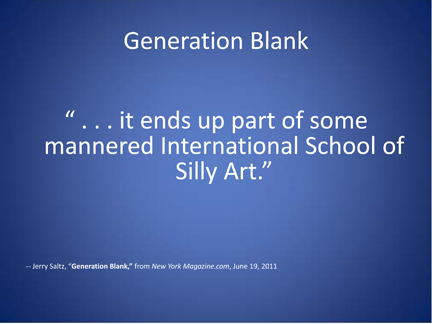
I couldn't agree more, and I do believe that MFA programs are largely to blame.
Conclusion:
To go over my main points again:
My research shows that an MFA doesn't give you an advantage in getting into commercial galleries or museums, making a living as an artist or getting grants.
It's very expensive and saddles you with student debt that you have very little chance of paying off by working in your chosen field.
Save your money, live your life, read, travel, pay attention, learn to think for yourself. Work hard, look inside yourself and make yourself the best artist you can be.
Oh, and BTW, I won :-)
*A word about my research: it is completely unscientific and was limited by time and resources. I included only living artists and excluded artists for whom I couldn't find enough information. I feel I just scratched the surface, but results were fairly consistent across the board.
Cross-posted from Jane Chafin's Offramp Gallery Blog.
